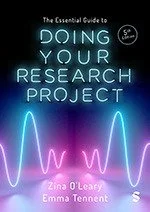Helping students critically engage with research
Guest post by Dr Emma Tennent
There are some perennial challenges to doing a research project that all of us have faced: formulating a research question, wrestling with paradigmatic assumptions, keeping on track of a multi-year project. The Essential Guide to Doing Your Research Project has been helping students (and supervisors) for more than 20 years. But in a post-pandemic world with the transformations being wrought by artificial intelligence, datafication, and the rise and fall of social media platforms, there are new challenges facing researchers.
I was delighted to be invited by Zina O’Leary to join as an author for the fifth edition. I’m passionate about improving students’ research literacy, challenging assumptions about the quantitative-qualitative ‘divide,’ and empowering students be critical consumers and producers of research. Living and working in Aotearoa New Zealand, I am sensitive to the ways research is implicated in systems of imperialism and colonisation. These ‘big picture’ forces can sometimes seem quite distant for students embarking on a research project – particularly if their topic or approach is not critical in orientation. Yet these dynamics structure many underlying assumptions about what research is, where it happens, and how we should engage with it.
The fifth edition foregrounds power and politics across the text. This includes a substantially revised chapter, “Undertaking Credible and Ethical Research”, which encourages students to develop reflexivity about their own positionality and their approach to research. We have included new critical thinking challenges to encourage reflection about whose voices are represented in the ‘canon’ of scholarly literature and how this might shape students’ research questions and literature reviews.
One rapidly changing area of research practice concerns digital data. There are new ways to access, collect, store, and share data that have their own ethical considerations and challenges. Many widely used techniques of just a few years ago (e.g. scraping tools from Twitter) are already out of date – and the platforms themselves have changed almost unrecognisably. Our “Online Generated Data” chapter has been updated with a focus on transferrable skills and overarching principles that apply across software and platforms. We situate the technical decisions involved in data collection within the wider context – where debates about the energy demands of data storage, shifts towards open access publishing, and indigenous data sovereignty pose no easy answers. Instead, we give students tools to critically weigh their decisions and figure out the stance that best suits them and their projects.
Another crucial skill for students – within their research journeys and beyond – is communicating their findings to a range of audiences. Higher education institutions around the world are emphasising the importance of research translation and knowledge transfer. This is an important obligation to avoid the ‘ivory tower’ stereotype of academia. Yet it’s not always straightforward to know how best to engage in such work. Our updated chapters on “The Challenge of Writing Up” and “Final Hurdles” provide practical tips including the importance of storytelling, visual communication, and accessible design. These skills matter more than ever in an increasingly precarious job market where many of our students will not go on to academic careers. And they offer important reminders (to all of us) of the importance of bringing our research stories alive for the people who matter.
Find out more and order your copy of The Essential Guide to Doing Your Research Project (2025) by Zina O’Leary and Emma Tennent here

